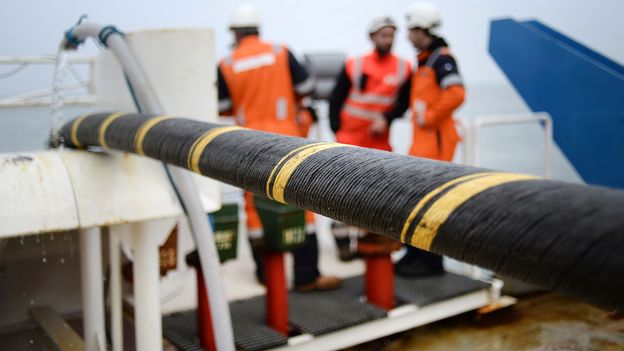- Joined
- Apr 18, 2013
- Messages
- 94,329
- Reaction score
- 82,715
- Location
- Barsoom
- Gender
- Male
- Political Leaning
- Independent
How Vulnerable Are Undersea Cables That U.S. Says Russia Is Tracking?

Undersea fiber-optic cable
Russian deep-sea ocean research vessels don't sit in a particular spot for no reason. They're locating/investigating/mapping something of interest on the seabed.
Undersea fiber-optic cable
6/12/18
Announcing fresh sanctions against Russia this week, the U.S. Treasury Department accused Moscow of "tracking undersea communications cables" and imposed punitive measures on a St. Petersburg firm that it says provided underwater diving equipment to Russia's Federal Security Service (FSB). The announcement followed warnings by U.S. and other Western officials about Russian activities in recent years near undersea cables that serve as conduits for nearly all global telecommunications data. "We are now seeing Russian underwater activity in the vicinity of undersea cables that I don't believe we have ever seen," U.S. Navy Rear Admiral Andrew Lennon, the commander of NATO's submarine forces, told The Washington Post in December. Britain's military chief, Sir Stuart Peach, said in December that Russia could pose a major threat to NATO by attacking undersea cables critical for international trade and the Internet. He warned that economies could be hit "immediately and potentially catastrophically" if the cables were severed or otherwise disrupted. But just how vulnerable is this network of cables, known as the "backbone of the global Internet," to sabotage and other manipulation?
As of early 2018, there were an estimated 448 submarine cables -- totaling more than 1 million kilometers in length -- operating throughout the world, according to TeleGeography, a Washington-based market research firm. This network, however, includes so-called "chokepoints" where crucial cable routes converge, according to a 2010 study by the Institute of Electrical and Electronics Engineers and the EastWest Institute think tank. "A single disaster in such an area could cause catastrophic loss of regional and global connectivity," the report said. Starosielski told Wired last month, however, that "the amount of anxiety about somebody sabotaging a single cable or multiple cables is overblown." In September 2015, the United States monitored the Russian research vessel Yantar as it traveled to Cuba along the U.S. East Coast. The New York Times cited U.S. Navy officials as saying that it carried submersible crafts capable of diving and cutting undersea cables. The U.S. Treasury Department, which identified the St. Petersburg underwater equipment company as Divetechnoservice, did not explicitly specify any connection between it and the Yantar Baltic Shipyard, which built the Yantar research vessel. However, Russian government procurement documents, as well as arbitration records, show that Divetechnoservice signed contracts in 2012 with the shipyard to produce and test a one- and two-man deep-water submersible capable of operating at depths up to 1,000 meters (3,000 feet). And the company's website includes photographs of the submersible crafts.
Russian deep-sea ocean research vessels don't sit in a particular spot for no reason. They're locating/investigating/mapping something of interest on the seabed.
